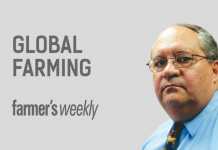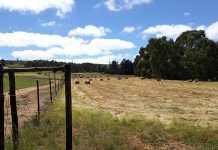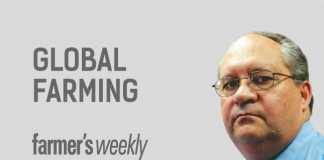Farm profits up in 2006, down in 2007. The past year was a good one for farmers. According to a recent Department of Agriculture report, total gross farm income increased by 11,6%. This was the result of increases of 8,5% in crops, 5,5% in horticulture and 16,7% in livestock income. Farm expenditure increased by 10,5%, driven by sharp increases in feed, fuel and other prices. Farm profit increased by 21,2% to R14 275 million.
Despite this, farm debt increased by 2,5% to R37 477 million (25% of total assets). Farmers’ average net farm income on assets of 9,4% in 2006 was much better than that of 8,2% in 2005. Farm profit, after paying interest on the 25% debt, is R9 775 million which gives a return of 6,4% on capital. Lower production, stagnant livestock prices and higher input costs will result in a much lower 2007 profit.
Agribusiness profits
In contrast to farmers’ paltry profits, agribusinesses did very well in 2006. Afgri’s profit increased from R172 million in 2005/06 to R276 million for 2006/07 – an increase of 60%. Afgri’s results are exceptional if compared to the profit farmers make, but not unusual if compared to the profits other agribusinesses make.
In the past, farmers owned most of these agribusinesses. This changed when co-ops became public companies. While some of them are still run on cooperative principles, the majority are run with only the interests of the shareholder in mind. The goal is to make the highest possible profit for shareholders, who are in many cases no longer the farmer-owners of the co-op.
While nobody begrudges agribusinesses their good profits and high remuneration, the sad fact is that farmers’ profits will decrease significantly during 2007, while agribusinesses will still make good profits. Implications for farmers Farmers will not manage to turn the clock back and regain control of agribusinesses on a financial or organisational level. Instead of worrying about the high profits agribusinesses make, farmers should develop their own strategies. There are various ways for farmers to increase their share of total agricultural turnover.
A large part of the former cooperatives’ profits come from their grain-handling and trading departments. Farmers who take out fixed-price contracts this year will again provide good profits for grain traders. Safex should be used not only as a price indicator but to hedge prices. At a recent producer meeting, a Western Cape farmer bemoaned the fact that he now pays R2 000 for maize that cost R1 100 in November. If he had hedged the price in November, he could still be paying R1 100. Maize users and producers can significantly reduce transaction costs if they trade with one another directly. Some larger producers could save on grain storage and handling costs if they set up their own facilities.
Farmers spend nearly a third of their total expenditure on intermediate inputs such as feed, and can do much to decrease their feed bill. Feed manufacturers have clearly shown over the past three years that they are unable to use Safex to hedge prices; farmers would do better to buy their own maize for rations. Feed manufacturers spend a lot of money on advertising to convince farmers that they offer unique products, but in fact their products are very similar. Compare and negotiate the best price.
Academics promote on-farm value-adding as the solution for farmers. While there are many successful examples of this, there are also many examples of the opposite. Economies of scale, market segmentation and management capacity all play a role in determining the success of such projects. If individual farmers do not have the necessary size and capacity, they can go the cooperative route. These new-style, single-purpose cooperatives will soon become a feature of South African agriculture as they already are in the US.
Farmers can do much to ensure that they get a larger share of the total agricultural and agribusiness turnover. Those who take the initiative will create prosperity for themselves, their families and their workers. Dr Koos Coetzee is an agricultural economist at the Milk Producers’ Organisation. All opinions are his own.




